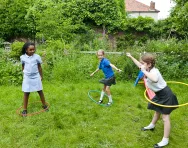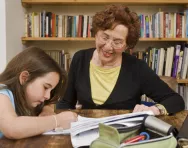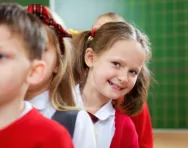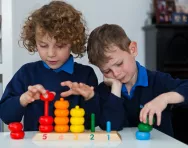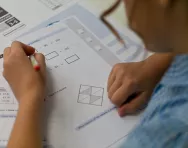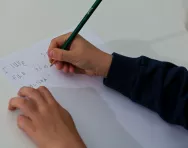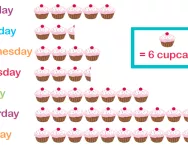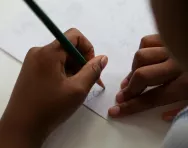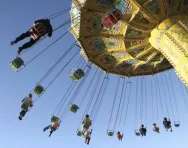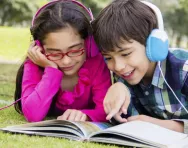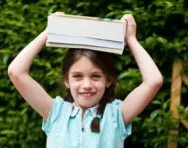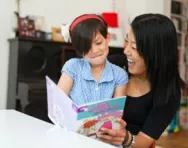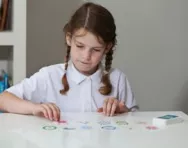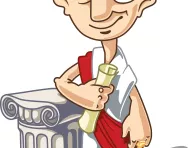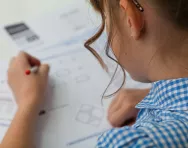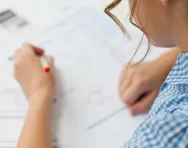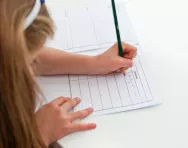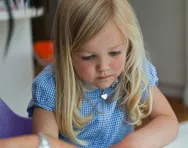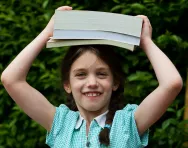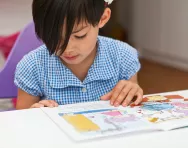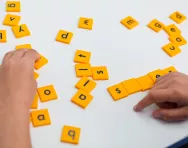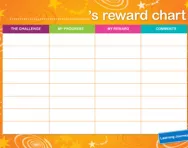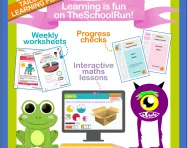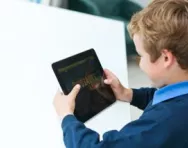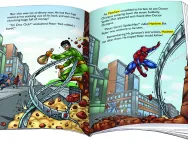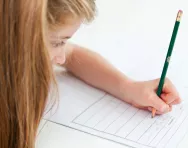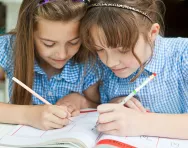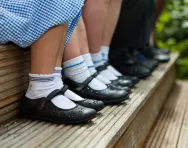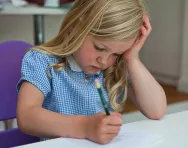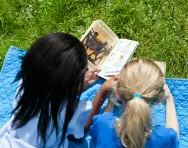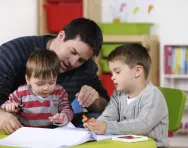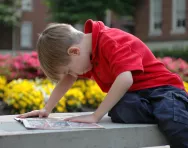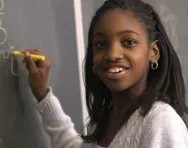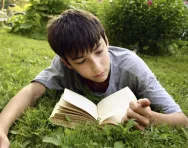The parents’ guide to after-school childcare: childminders
With a home-from-home environment and smaller numbers than an after-school club, childminders are a popular choice for after-school childcare. Here’s what you need to know.
The parents’ guide to after-school childcare: relatives
Getting a grandparent or other family member to provide after-school childcare can be a dream come true – or a bit of a nightmare. Lucy Dimbylow looks at the pros, cons and practicalities.
What is a story setting?
Every story has a setting, and primary-school children learn to analyse story settings in other people's writing before using the same techniques in their own fiction writing. Read on for details of how story settings are taught in KS1 and KS2.
What is an academy?
More and more primary schools in England are converting to academy status. If your child’s school is planning to make the transition, what could it mean for them?
Does my child have dyscalculia?
What are the signs to look out for if you think your child might have dyscalculia or 'number blindness', and what can be done to help?
7 strategies to help defeat children’s fear of maths
What does it mean if your child has a fear of maths, and what can you do to help them get over it? TheSchoolRun offers a step-by-step plan to help you boost your child's confidence – and your own.
Dyspraxia: parents' questions answered
Dyspraxia, or Developmental Co-ordination Disorder (DCD), causes problems with language, perception and thought – most specifically issues with co-ordination. Around one in seven children has this learning difficulty and if your child is affected it can be hard to know how to help for the best. Here we answer some of the most common questions parents ask.
What is a pictogram?
Pictograms are introduced in Year 2 as a simple and engaging introduction to bar charts. We explain what your child needs to know about pictograms and how to read and create them, as well as explaining when and how they're taught.
What are inverse operations?
Inverse operations are opposite operations – one reverses the effect of the other. In primary maths we talk about the inverse to explain how addition and subtraction are linked and how multiplication and division are linked. Teacher Alice Hart offers examples of how and when your child will be asked to use the inverse operation in school, and practical ways to help them understand the concept.
Your child's new school year preparation plan
Each year group brings fresh challenges in literacy and numeracy. Want to give your child a head start? Primary teacher Phoebe Doyle offers some easy-to-action advice on tackling an objective from the year group your child is about to enter during the summer break.
Holiday learning in theme parks, museums and on the move
Holidays are anything but an education-free-zone says Phoebe Doyle, teacher and mum. Make the most of your children's experiences outside the classroom by turning them into literacy and numeracy learning adventures.
Listen and learn: why audiobooks are great for your child
Whether your child is a voracious reader or is horrified at the suggestion of picking up a book, audiobooks could have some surprising benefits. Lucy Dimbylow explains how they could boost literacy skills, and shares our pick of the best to get you started.
Learning tips for kinaesthetic learners
To you, they might look like a fidget, but your child’s restlessness could actually be helping them learn. Find out more about the theory of kinaesthetic learners and how learning styles might be discussed during your child's time at primary school.
How to help your auditory learner
If your child prefers reading aloud, is always talking to themselves and provides a running commentary of everything they do, they could be an auditory learner. We explain what the learning styles theory suggests and why you might hear about t during your child's time at primary school.
Is your child a visual learner?
Does your child have an obsession with highlighters, or spend hours looking at YouTube videos about their latest class topic? They might be a visual learner. Read our guide to the theory of learning styles and how it might be mentioned during your child's time at primary school.
Cool classics: Latin and Ancient Greek at primary school
If your child is often heard incanting Harry Potter spells, he’s probably familiar with a few Latin words already. But could Latin or Ancient Greek be on his school syllabus next year? Lucy Dimbylow looks at the benefits of learning classics, and how to get started at home.
What are national curriculum levels?
In the past, primary school children taking SATs were given their results as a National Curriculum level. But what did these numbers actually mean? Lucy Dimbylow explains the grading system used in primary schools until September 2014 in parent-friendly language.
National Reading and Numeracy Tests explained for parents
All children in Wales from Y2 to Y9 take tests in reading and numeracy at the end of each school year. Find out what these tests involve, and how you can help your child prepare for them.
Chess: the perfect game for kids
It’s free, portable, quiet enough to play anywhere and has powerful brain-boosting benefits for kids – and it’s fun, too. Here’s why you should get your child hooked on chess.
21 things every parent needs to know about cursive handwriting
Learning to print letters was hard enough, and now your child is being encouraged to join them up. Lucy Dimbylow explains everything you need to know about cursive writing, and how you can support your child at home.
KS1 maths SATs: what is tested in the Y2 assessments
Although KS1 SATS are no longer compulsory, your child's school may still choose to administer them as a way of tracking pupils progress. We review the learning objectives in parent-friendly language and give you examples and tips to help you support your child’s mathematical education at home.
5 ways to raise an enterprising child
As parents we have a vital role to play in inspiring an enterprising attitude in our children, nurturing characteristics from an early age which will help them grow into happy adults. Lorraine Allman shares some easy, practical tips to help boost children's self-belief and confidence.
KS1 English SATs: what is tested in the Y2 assessments
KS1 SATs are no longer compulsory, but some schools may still choose to administer them. We explain KS1 English SATs learning objectives, plus how to support your child’s literacy learning at home.
6 steps to a money-savvy child
We all want our kids to have the very best future, and ensuring they’ve got money sense is crucial to help make it happen. Mum-of-two and financial whizz Emily Richards shares a few down-to-earth strategies to equip your child with money management skills for life.
Simple ways to make spellings fun
If your child’s spellings have become the bane of your week-end it’s time to take a look at how you tackle the weekly-test challenge. Teacher Phoebe Doyle offers 10 suggestions to help make spelling practice more playful than stressful.
The Learning Journey reward chart and certificates
Support your child's Learning Journey with these fantastic motivational resources – a colourful reward chart where you can set your own challenges and choose rewards together, and printable certificates to celebrate success.
How the Learning Journey works
Find out how our fantastic primary school learning programme – The Learning Journey – could benefit you and your child as well as full details of how to use the reward charts and certificates!
Best children’s tablets
Learning through play is digital now, with apps and games teaching everything from phonics to times tables and basic physics. If you’re planning to invest in a children’s tablet packed with educational potential, read our guide first – we asked two computer-savvy parents and six children to put some of the most popular through their paces.
Best children’s books about Christmas
Get into the festive spirit with some Christmas-themed bedtime stories – perfect to snuggle up to in front of the tree, sipping mulled wine (you) and hot chocolate (them). From wintery classics to new favourites about Father Christmas and his life in the North Pole, this reading list is suitable for all ages.
Best personalised books for children
Give your child a really unique introduction to the world of fiction with a personalised book – after all, who wouldn’t want to be the hero or heroine of a fantastic adventure? Seeing their name – and face – in print, alongside favourite characters, will be a thrill whether they’re just starting to read for themselves or ready to embark on classic literature. We pick the best personalised books where your child has the starring role.
7 common dyslexia questions answered
If your child is dyslexic you'll want to help them get the support they need at school and at home. Dr John Rack, Head of Research, Development and Policy at Dyslexia Action, answers common questions about dyslexia identification, homework and tutoring and suggests sources of further information and advice to help you help your child.
Beat back-to-school nerves
Many children feel a bit nervous about the start of a new school year, but for some, the jitters continue beyond the first few days. Here’s how to help your child de-stress if they’re finding going back to school a struggle.
You know you’re a primary school parent when…
Having a child at primary school grants you access to an exclusive club. Here’s what the members all have in common, says Lucy Dimbylow.
Best labelling solutions for school
Wish there was a labels fairy to transform the uniform pile into a neat stack of personalised clothing? Whether you’re super-organised and spread your labelling over the holidays or prone to last-minute panics and label-sewing all-nighters, these products are designed to help you get the job done – and look great, too.
Handwriting practice: what all parents need to know
If you’re worried about your child’s handwriting and want to help them improve, you’re not alone – handwriting is an essential skill, but we all have to learn it, and it’s a very complex task. Legible, neat handwriting takes lots of practice – here are a few things to keep in mind when you’re working with your child at home.
7 of the best children’s reads for summer 2012
Mysteries, thrillers, supernatural tales and chick lit – we all want to pack a good book to read on holiday so make sure your child isn’t left out! From historical fiction to the new classic from Jacqueline Wilson, this super selection of books for KS2 readers means the whole family can have a fiction-packed break.
Siblings and homework: how to survive
Does your pre-schooler play havoc during his older sibling’s homework time? Is getting the reading, writing and spelling done a military operation every evening? Lucy Dimbylow asked experts and mums for their coping strategies.
Using comics to improve your child’s literacy
Struggling to get your child to pick up a book? A comic might have more appeal – and some surprising literacy-boosting benefits, especially for boys. Lucy Dimbylow explains why you don’t need to be snobbish about your child’s choice of reading material.
What does gifted and talented mean?
Gifted and talented, more able, most able, high learning potential… We explain the terms that are used to describe high-flying kids, and how you can tell if your child is one.
Supporting your gifted child at home and at school
Help your child reach their full potential with strategies and suggestions to support them in and out of school.
